
 Flash News
Flash News
Drenova prison police officer arrested for bringing drugs and illegal items into cell
Lavrov: NATO is risking self-destruction with new military budget
Kurti and Vučić "face off" tomorrow in Skopje
Construction worker dies after falling from scaffolding in Berat
The prosecution sends two Korça Municipality officials to trial

Alfred Lela
Sixteen days after the elections, the U.S. Embassy in Tirana ended what had become a Shakespearean suspense yesterday — but it didn’t clear up, not even slightly, the interpretations, doubts, or questions surrounding what it said.
In fact, all of them multiplied — not only because the Embassy said little while saying a lot, and simultaneously tried to say nothing at all, but also because, as usual, the two familiar camps jumped into interpretation: the government and the opposition.
If, for a moment, we set aside not just those who are interested but those who are conflicted by interest, we notice a few things.
First, the U.S. reaction came just hours after a statement in Korça by the head of the EU Mission in Tirana, Gonzato. In short, the European envoy recognized the elections without hesitation, placing only the "burden" on the government to draft and pass a more acceptable Electoral Code.
Was the timing of the Embassy’s reaction connected to that of the EU Mission?
Second, the “greeting” of the Albanian elections didn’t meet even the standard of a Caribbean microstate like Belize. In Albania, it was the Embassy that issued congratulations; in Belize, it was the State Department. In the case of Albania, the people were congratulated; in Belize, it was the winning prime minister by name.
What sharpened the irony even more was that the Embassy spoke of a partnership with the people of Albania — not the government.
Was the exclusion of Rama, the government, and the winning Socialist Party intentional or a coincidence?
Third, the delay itself — the fact that it took the Embassy 16 days to craft two sentences — fits the notion that, in diplomacy, one can speak through silence and timing, including deliberate delay.
In diplomatic tradition, partner-country embassies or the State Department itself usually respond to elections — with praise or criticism — within 3 to 4 days.
What made the U.S. Embassy break with this pattern?
Fourth, and this is not about the statement itself, but rather the context it created: U.S. policy toward political parties in Tirana has changed. Or more precisely, it has normalized.
There is a history of hitting the right — both in government and in opposition — that began with Ambassador Withers, was interrupted by Ambassador Arvizu, and returned, almost pathologically, under the last ambassador, Ms. Kim.
In this sense, the Embassy’s statement was a declaration of return to normality, to clarity, a stepping away from theatricality and damaging over-involvement.
This time, the Embassy spoke as the representative of a friendly country, not as a partner or mentor to one political side.
What stands out is that, while the Embassy “congratulates” the Albanian people for the “choice” they made, it does not attempt to define who or what constitutes Albania’s opposition.
Looking at the frothing commentary of media aligned with the government, one sees what the real concern is: “Rruga e Elbasanit” no longer speaks on behalf of Rama or Veliaj, or via Soros or Charles McGonigal.
The old partnerships have fallen away — and while how the new ones will look is not the topic here, Vice President JD Vance’s speech at the Munich Conference, and who the next U.S. Ambassador to Tirana will be, will certainly play a role.
Latest news



Second hearing on the protected areas law, Zhupa: Unconstitutional and dangerous
2025-06-30 22:18:46



Israel-Iran conflict, Bushati: Albanians should be concerned
2025-06-30 21:32:42

Fuga: Journalism in Albania today in severe crisis
2025-06-30 21:07:11
"There is no room for panic"/ Moore: Serbia does not dare to attack Kosovo!
2025-06-30 20:49:53

Temperatures above 40 degrees, France closes nuclear plants and schools
2025-06-30 20:28:42
Lavrov: NATO is risking self-destruction with new military budget
2025-06-30 20:13:54
Turkey against the "Bektashi state" in Albania: Give up this idea!
2025-06-30 20:03:24

Accused of sexual abuse, producer Diddy awaits court decision
2025-06-30 19:40:44



Kurti and Vučić "face off" tomorrow in Skopje
2025-06-30 18:44:12
Tourism: new season, old problems
2025-06-30 18:27:23


Construction worker dies after falling from scaffolding in Berat
2025-06-30 17:51:44




Almost free housing: East Germany against depopulation
2025-06-30 16:43:06

Hamas says nearly 60 people killed in Gaza as Trump calls for ceasefire
2025-06-30 16:14:15
Drownings on beaches/ Expert Softa: Negligence and incompetence by institutions!
2025-06-30 16:00:03


European ports are overloaded due to Trump tariffs
2025-06-30 15:30:44
The prosecution sends two Korça Municipality officials to trial
2025-06-30 15:19:54

Lezha/ Police impose 3165 administrative measures, handcuff 19 drivers
2025-06-30 14:55:04
Young people leave Albania in search of a more sustainable future
2025-06-30 14:47:52
Record-breaking summer, health threats and preventive measures
2025-06-30 14:36:19


Constitution of the Parliament, Osmani invites political leaders to a meeting
2025-06-30 14:07:54

Heat wave 'invades' Europe, Spain records temperatures up to 46 degrees Celsius
2025-06-30 13:42:02
Accident in Vlora, car hits 2 tourists
2025-06-30 13:32:16

Kurti confirms participation in today's official dinner in Skopje
2025-06-30 13:03:27

Fight between 4 minors in Kosovo, one of them injured with a knife
2025-06-30 12:38:45

Report: Teenage girls the loneliest in the world
2025-06-30 12:20:40
Commissioner Kos and Balkan leaders meet in Skopje on Growth Plan
2025-06-30 12:07:59
Wanted by Italy, member of a criminal organization captured in Fier
2025-06-30 11:55:53
Hundreds of families displaced by wave of Israeli airstrikes in Gaza
2025-06-30 11:45:17

Zenel Beshi: The criminal who even 50 convictions won't move from Britain
2025-06-30 11:23:19
A new variant of Covid will circulate during the summer, here are the symptoms
2025-06-30 11:14:58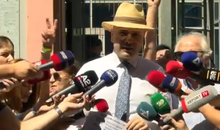

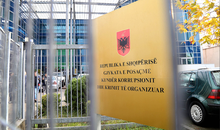
"Partizani" case, trial postponed to July 21 at the Special Court
2025-06-30 10:41:05
Uncontrolled desire to steal, what is kleptomania, why is it caused
2025-06-30 10:30:08
Requested change of security measure, hearing for Malltez postponed to July 7
2025-06-30 10:24:32


Output per working hour in Albania 35% lower than the regional average
2025-06-30 09:54:35

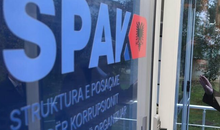
The trial for the "Partizani" file begins today
2025-06-30 09:27:57
22 fires in the last 24 hours in the country, 2 still active
2025-06-30 09:21:28
How is the media controlled? The 'Rama' case and government propaganda
2025-06-30 09:13:36
German top diplomat: Putin wants Ukraine to capitulate
2025-06-30 09:00:07
Foreign exchange, how much foreign currencies are sold and bought today
2025-06-30 08:44:38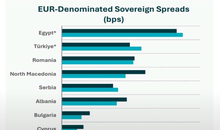
Chart/ Sovereign risk for Albania from international markets drops significantly
2025-06-30 08:26:38
Horoscope, what do the stars have in store for you?
2025-06-30 08:11:44
Clear weather and passing clouds, here is the forecast for this Monday
2025-06-30 07:59:32
Morning Post/ In 2 lines: What mattered yesterday in Albania
2025-06-30 07:47:37
Milan make official two departures in attack
2025-06-29 21:57:23
6 record tone
2025-06-29 21:30:46
4-year-old girl falls from balcony in Lezha, urgently taken to Trauma
2025-06-29 21:09:58


Assets worth 12 million euros seized from cocaine trafficking organization
2025-06-29 19:39:43
Fire in Durrës, Blushi: The state exists only on paper
2025-06-29 19:17:48

Fire endangers homes in Vlora, helicopter intervention begins
2025-06-29 18:27:51
France implements smoking ban on beaches and parks
2025-06-29 18:02:08
England U-21 beat Germany to become European champions
2025-06-29 17:42:49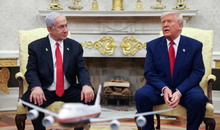
Trump criticizes Israeli prosecutors over Netanyahu's corruption trial
2025-06-29 17:08:10
Street market in Durrës engulfed in flames
2025-06-29 16:52:57

UN nuclear chief: Iran could resume uranium enrichment within months
2025-06-29 16:03:24
Albanian man dies after falling from cliff while climbing mountain in Italy
2025-06-29 15:52:01

Another accident with a single-track vehicle in Tirana, a car hits a 17-year-old
2025-06-29 15:07:15
While bathing in the sea, a vacationer in Durrës dies
2025-06-29 14:54:01
Sentenced to life imprisonment, cell phone found in Laert Haxhiu's cell
2025-06-29 14:26:40
77 people detained in protest, Vučić warns of new arrests
2025-06-29 14:07:46

